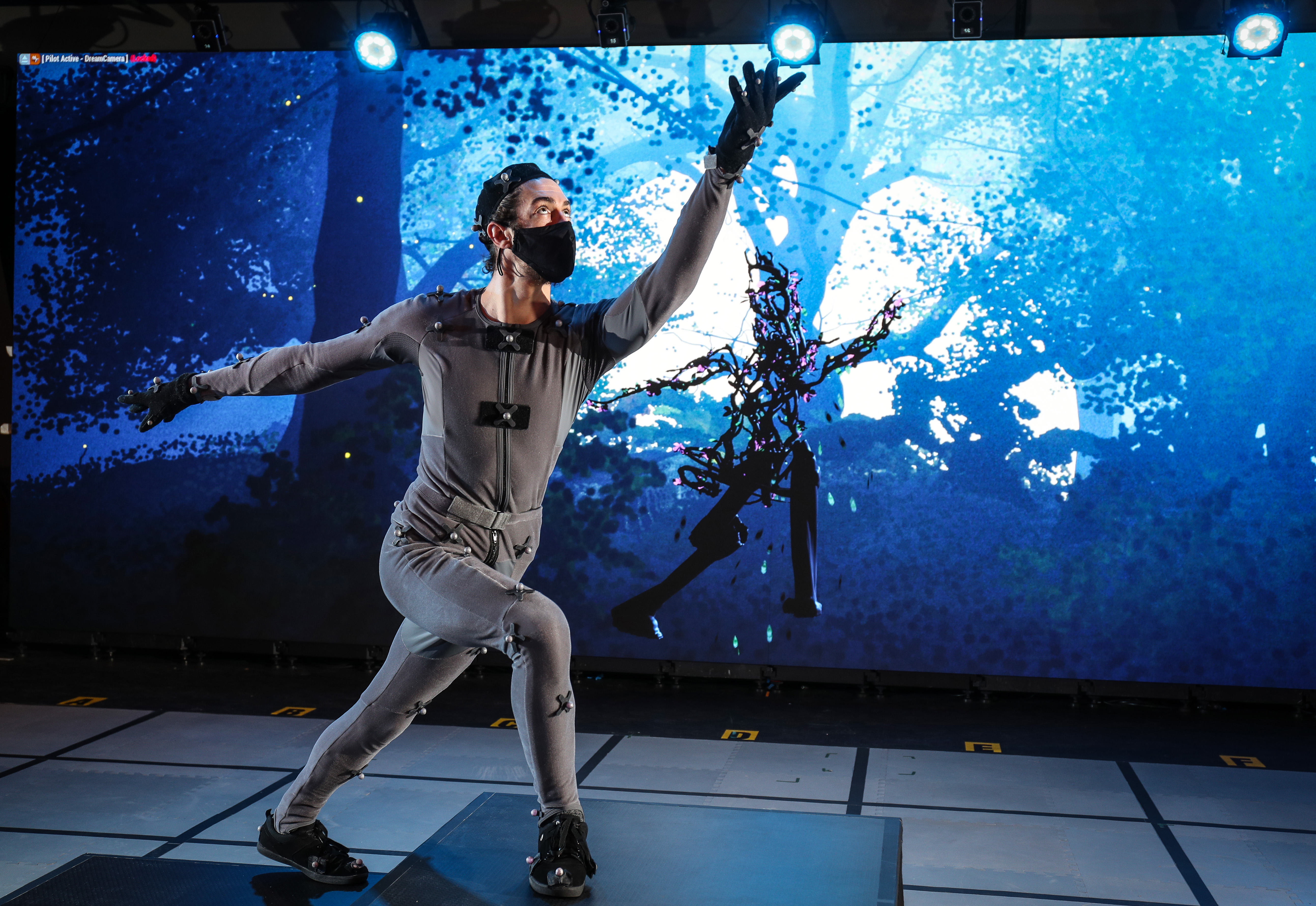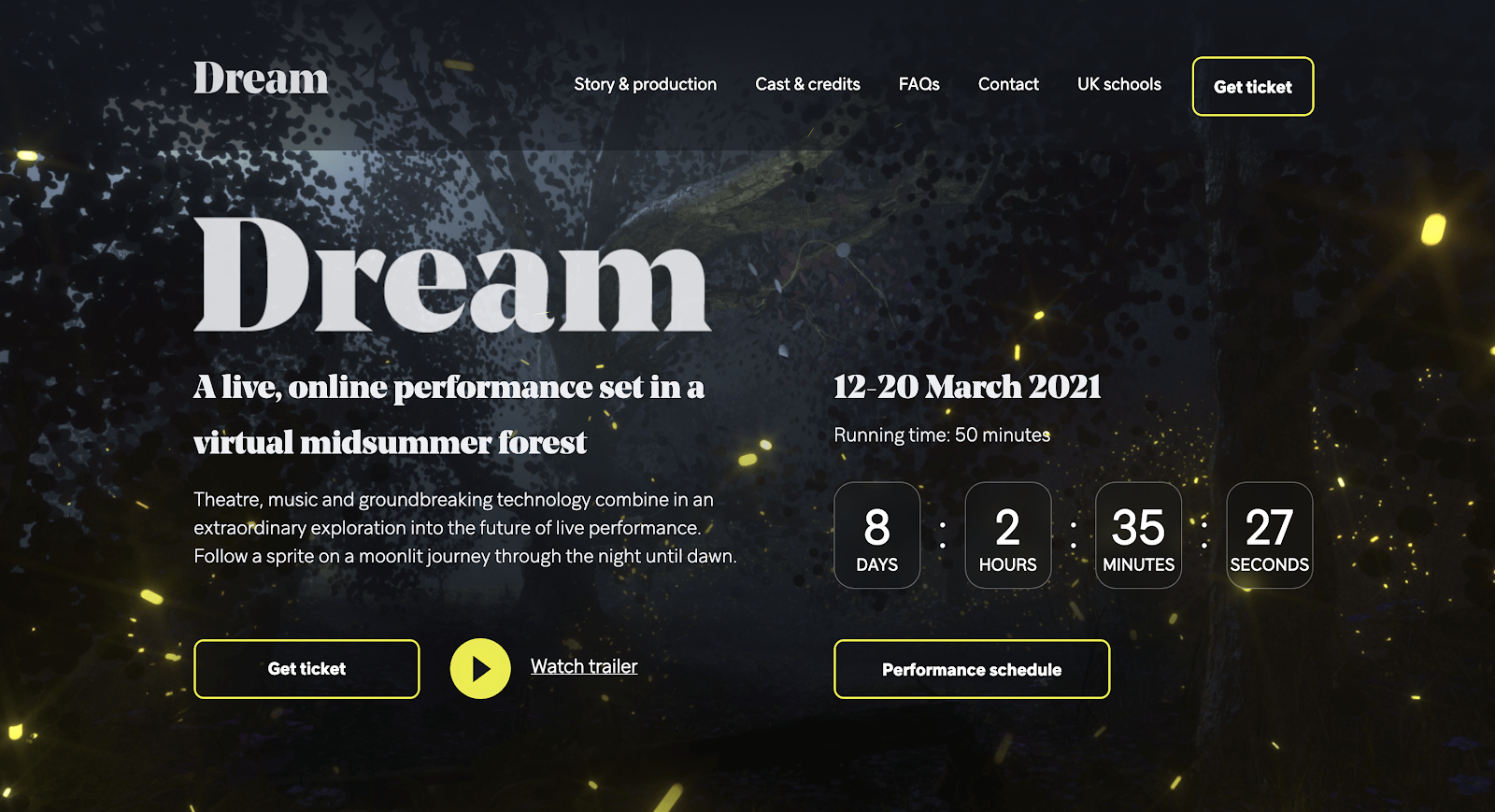The Audience of the Future (AotF) is a consortium led by the Royal Shakespeare Company (RSC), in collaboration with Manchester International Festival, Marshmallow Laser Feast and Philharmonia Orchestra. The AotF group was granted funding to create and distribute a live, interactive performance to a remote audience. The performance, Dream, is a reimagining of the Shakespeare play A Midsummer Night’s Dream. The ambitious project combines performance and gaming technology, uncovering new ways for audiences to experience live theatre.
The AotF approached FX Digital searching for a partner to help deliver an immersive ticket marketing website to educate audience members on the performance, enabling them to book tickets through RSC’s website. Further, a virtual lobby area was required to host the pre-performance, stream and post-performance experience. Our goal was to help create the sense of a collective experience for the audience and for the audience to also have their own opportunity to shape this experience.

We began tackling the two-part brief by designing and developing the ticket marketing website. Working in collaboration with RSC and AotF, we designed an atmospheric forest environment to create intrigue and capture the audience’s attention. With users taking on the role of a firefly in the performance itself and fireflies being a key motif throughout, we used Lottie animations to create the effect of fireflies moving around the screen. This helped to reflect an experience that feels alive from the beginning, immersing the user immediately in the experience.
A count-down timer was included to create anticipation for the limited run of performances and encourage customers to buy their tickets in time for the performance.
To integrate the ticket selling platform on the RSC website with the ticket marketing site, we created an API for the back-end of the website. When a user purchases a ticket on the RSC site, they are seamlessly returned to the marketing website to create a smooth experience for the user.
Deploying magic links for Dream performance ticket purchases lets users access the performance without passing over any personal details when entering the lobby, allowing RSC to control communication with the audience and keeping users anonymous to ensure privacy. This also created an access point to view the performance without having to go through the RSC website, while still allowing them to control communication with customers.

When building the virtual lobby, we wanted to develop an experience that allowed the audience to feel as if they were spending an evening at the theatre, recreating the same buzz and atmosphere theatregoers would expect if they were viewing a performance in person. To enhance the experience, we created a top-down forest journey with interactive tooltips mapped around the forest, which guide the user through what they are about to experience. Not only does this enhance the user experience, but it also provides key information to help the user understand how to interact with the live environment.
The lobby area needed to host two different streams, as users have the option to purchase an interactive ticket or a passive ticket (a free ticket option to ensure everyone can enjoy the performance). This involved complex scenario handling to ensure different versions of the lobby – based on the type of ticket and the type of performance – would display for the users.
The lobby area sets the scene, provides background information on the performance, show run times, introduces the audience to the characters on-stage and gently guides them to prepare for the show, getting them to settle down, turn the lights off and prepare for the unique experience that awaits them. This area also includes an audience counter, so the user gets the feeling of the collective, as they would in a real lobby at the theatre.
Across both the ticket marketing platform and streaming platform, accessibility was a key part of the development and design process. The AotF stressed the importance that the Dream experience had to be as accessible as possible from the beginning of a user journey to the end. By including features such as high contrast mode, increasing text sizes, and making the website screen reader friendly, we created an accessible user experience to allow all users to enjoy Dream.
Dream launched on March 12th with a run of ten performances. We are incredibly proud to be part of this incredible project which brought together talented companies from across a number of creative industries and sectors, to push the boundaries of live performance and set a new standard for immersive theatre.
Dream is brought to you by the Audience of the Future Consortium. The project is funded within the Audience of the Future programme by UK Research and Innovation through the Industrial Strategy Challenge Fund.
Audience of the Future consortium – Led by the Royal Shakespeare Company (RSC) the Audience of the Future consortium includes De Montfort University · Epic Games · i2 Media Research Limited · Intel Studios · Magic Leap · Manchester International Festival · Marshmallow Laser Feast · Nesta · Phi Centre · Philharmonia Orchestra · Punchdrunk · University of Portsmouth · The Space.
Dream is generously supported by Miranda Curtis CMG, the Sidney E. Frank Foundation, Audrey Mandela and Sean Phelan, and is an EPIC MegaGrants recipient.